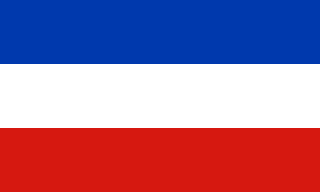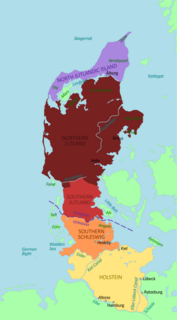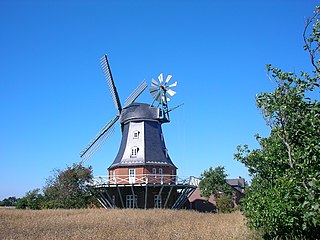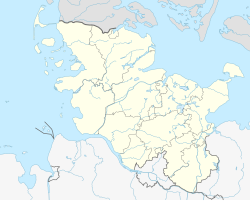
Schleswig-Holstein is the northernmost of the 16 states of Germany, comprising most of the historical duchy of Holstein and the southern part of the former Duchy of Schleswig. Its capital city is Kiel; other notable cities are Lübeck and Flensburg.

The Duchy of Schleswig was a duchy in Southern Jutland (Sønderjylland) covering the area between about 60 km north and 70 km south of the current border between Germany and Denmark. The territory has been divided between the two countries since 1920, with Northern Schleswig in Denmark and Southern Schleswig in Germany. The region is also called Sleswick in English.
Ostholstein is a district in Schleswig-Holstein, Germany. It is bounded by the districts of Stormarn, Segeberg and Plön, the Baltic Sea and the city of Lübeck.

Holstein is the region between the rivers Elbe and Eider. It is the southern half of Schleswig-Holstein, the northernmost state of Germany.

The history of Schleswig-Holstein consists of the corpus of facts since the pre-history times until the modern establishing of the Schleswig-Holstein state.

The House of Glücksburg, shortened from House of Schleswig-Holstein-Sonderburg-Glücksburg, is a collateral branch of the House of Oldenburg, members of which have reigned at various times in Denmark, Norway, Greece, and several northern German states.

The House of Oldenburg is a European dynasty of North German origin and with strong links to Denmark since the 15th century. It is one of Europe's most significant royal houses, with branches that rule or have ruled in Denmark, Iceland, Greece, Norway, Russia, Sweden, Schleswig, Holstein, and Oldenburg. The current Queen of Denmark and King of Norway, the former King of Greece, the late consort of the monarch of the United Kingdom, as well as the first 11 persons in the line of succession to the British throne, are all patrilineal members of the Glücksburg branch of this house.

The First Schleswig War or Three Years' War was the first round of military conflict in southern Denmark and northern Germany rooted in the Schleswig-Holstein Question, contesting the issue of who should control the Duchies of Schleswig and Holstein. The war, which lasted from 1848 to 1851, also involved troops from Prussia and Sweden. Ultimately, under international pressure, the Prussians had to withdraw their forces. As a result, the war ended in a Danish victory over the rebels and the signing of the London Protocol in 1852. A second conflict, the Second Schleswig War, erupted in 1864.

The Second Schleswig War also sometimes known as the Dano-Prussian War or Prusso-Danish War was the second military conflict over the Schleswig-Holstein Question of the nineteenth century. The war began on 1 February 1864, when Prussian and Austrian forces crossed the border into Schleswig. Denmark fought the Kingdom of Prussia and the Austrian Empire. Like the First Schleswig War (1848–1852), it was fought for control of the duchies of Schleswig, Holstein and Lauenburg, due to the succession disputes concerning them when the Danish king died without an heir acceptable to the German Confederation. The war started after the passing of the November Constitution of 1863, which integrated the Duchy of Schleswig into the Danish kingdom in violation of the London Protocol.

The Schleswig-Holstein Question was a complex set of diplomatic and other issues arising in the 19th century from the relations of two duchies, Schleswig and Holstein, to the Danish crown, to the German Confederation, and to each other. The British statesman Lord Palmerston is reported to have said: "Only three people have ever really understood the Schleswig-Holstein business – the Prince Consort, who is dead – a German professor, who has gone mad – and I, who have forgotten all about it."

SMS Schleswig-Holstein was the last of the five Deutschland-class battleships built by the German Kaiserliche Marine. The ship, named for the province of Schleswig-Holstein, was laid down in the Germaniawerft dockyard in Kiel in August 1905 and commissioned into the fleet nearly three years later. The ships of her class were already outdated by the time they entered service, being inferior in size, armor, firepower and speed to the new generation of dreadnought battleships.

Eiderstedt is a peninsula in the district of Nordfriesland in the German federal state of Schleswig-Holstein.

Sankt Peter-Ording is a popular German seaside spa and a municipality in the district of Nordfriesland, in Schleswig-Holstein, Germany. It is the only German seaside resort that has a sulphur spring and thus terms itself "North Sea spa and sulphur spring". By overnight stays, St. Peter-Ording is the largest seaside resort and has the most overnight stays in the state of Schleswig-Holstein.

Garding is a town in the district of Nordfriesland, Schleswig-Holstein, Germany. It has a population of 2,700. It is located in the Eiderstedt peninsula, and part of the Amt Eiderstedt.

The Province of Schleswig-Holstein was a province of the Kingdom of Prussia from 1868 to 1946.

The Duchy of Holstein was the northernmost state of the Holy Roman Empire, located in the present German state of Schleswig-Holstein. It originated when King Christian I of Denmark had his County of Holstein-Rendsburg elevated to a duchy by Emperor Frederick III in 1474. Members of the Danish House of Oldenburg ruled Holstein – jointly with the Duchy of Schleswig – for its entire existence.

Borgsum is a municipality on the island of Föhr in the district of Nordfriesland, in Schleswig-Holstein, Germany.

Eiderstedt is an Amt in the district of Nordfriesland, in Schleswig-Holstein, Germany. The Amt covers the peninsula of Eiderstedt, excepted for the town of Tönning.

The Husum-Bad Sankt Peter-Ording railway is a 44 km-long, single-track non-electrified branch line in the German state of Schleswig-Holstein. The line connects the North Frisian town of Husum with all the important parts of the Eiderstedt peninsula, including Tönning, Garding and Sankt Peter-Ording. The line opened in 1854 and was one of the oldest railways in Germany.

Wolfgang Kubicki is a German politician of the Free Democratic Party of Germany (FDP). He has been vice chairman of the FDP in Germany since December 2013. Since 24 October 2017 he has served as Vice President of the Bundestag. From 1992 to 1993 and from 1996 to 2017 he served as chairman of the FDP-group in the Schleswig-Holstein state parliament.























